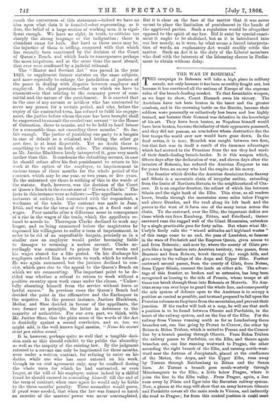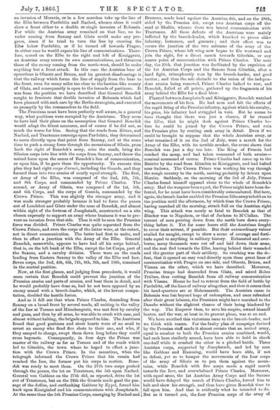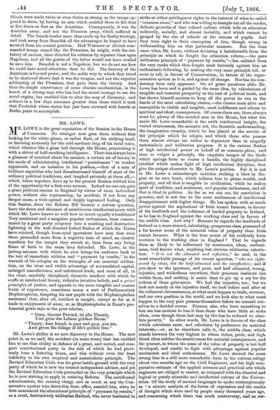THE WAR IN BOHEMIA:
THE campaign in Bohemia will take a high place in military annals, not only because it has been so swiftly fought out, but because it has convinced all the nations of Europe of the supreme value of the breech-loading musket. To that formidable weapon, as we hope to show, Count Bismark owes his victory. The Austrians have not been beaten in the lesser and the greater combats, and in the crowning battle on the Bistritz, because their soldiers were personally or collectively less brave and less highly trained, nor because their General was defective in the knowledge of his art. They have been beaten, as Napoleon himself would have been beaten, because the infantry of their opponents possessed, and they did not possess, au arm before whose destructive fire the best troops the world ever saw would have gone down. In the final action, it is true, Beuedek was caught between two fires, but that fact was in itself a result of the immense advantages which had accrued to the Prussians from the use they had made of their death-dealing breech-loader. It is this weapon which, fifteen days after the declaration of war, and eleven days after the invasion of Bohemia, has reduced the Austrian Emperor to sue for peace from an enemy who had the empire at his mercy.
The frontier which divides the Austrian dominions from Saxony and Silesia is a mountain chain of irregular outline, extending from the limits of Northern Bavaria to the neighbourhood of Cra- cow. It is an angular frontier, the salient of which lies between Silesia and the right bank of the Elbe. This river, as all readers know, breaks through the mountains some miles below Prague and above Dresden, and the road along its left bank and the passes to the west of it form one of the many issues across the chaiu. To the eastward, over the Elbe, the important defiles are those which run from Rumburg, Zittau, and Friedland ; thence eastward runs the rugged wall of the Giant Mountains, unbroken by a single practicable pass for forty miles. But where what Mr. Carlyle finely calls the " wizard solitudes and highland wastes " of this range come to an end, the pass of Landshut, so famous in the wars of Frederick and the Empress Queen, gives access to and from Bohemia ; and near by, where the county of Gists pro- jects like a huge bastion into Austrian territory, two passes, from Braunan and from Reiaerz, break through the rough hills, and give entry to the valleys of the Aupa and Upper Elbe. Further eastward several passes, from the county of Glatz, from Neisse, from Upper Silesia, connect the lands on either side. The advan- tage of this frontier, so broken and so extensive, has long been recognized as leaning to the side of Prussia, whose troops at all times can break through them into Bohemia or Moravia. No Aus- trian army can ever hope to guard the whole line, and consequently the sole system of defence open to the Austrians is to occupy a position as central as possible, and to stand prepared to fall upon the Prussian columns as theyissue from the mountains, and prevent their junction. If the reader will look at a map, he will see that such a position is to be found between Olmutz and Pardubitz, in the heart of the railway system, and on the line of the Elbe. For the railway from Vienna running north as far as Lundenburg there branches out, one line going by Prerau to Cracow, the other by Britian tc Bohm Triibau, which is united to Prerau and the Cracow line by a branch passing through Olmutz, From Bohm Triibau the railway passes to Pardubitz, on the Elbe, and thence again branches out, one line running westward to Prague, the other ascending the right branch of the Elbe, and turning north-west- ward near the fortress of Josephstadt, placed at the confluence of the Metau, the Aupa, and the Upper Elbe, runs away by Taman through Reichenberg to Zittau and the Saxon lines. At Turnau a branch goes south-westerly through Mtinchengratz to the Elbe, a little below Prague, where it joins the line in the Elbe valley. From Prague, again, a line runs away by Pilsen and Eger into the Bavarian railway system. Now, a glance at the map will show that an army between Olmutz and Pardubitz covers all the main roads to Vienna, and indirectly the road to Prague ; for from this central position it could meet an invasion of Moravia, or in a few marches take up the line of the Elbe between Pardubitz and Nachod, whence alone it could show a front either to a double or single invasion of Bohemia.
For while the Austrian army remained on that line, no in- vader coming from Saxony and Glatz could make any pro- gress, since if he tried to turn the line by crossing the Elbe below Pardubitz, or if he turned off towards Prague, in either case he would expose his line of communications. There- fore, seated on the Elbe to the right and left of Koniggratz, an Austrian army covers its own communications, and threatens those of the enemy coming from the north-west, should he make anything but a front attack. In this case the Austrian base of operations is Ohlautz and Briinn, and its greatest disadvantage is that the railway which forms the line of supply from the base to the front, runs for many miles too close to the bastion-like county of Glatz, and consequently is open to the inroads of partizans. It was from the position we have described that General Benedek sought to frustrate that double invasion of Bohemia which had been planned with such care by the Berlin strategists, and executed no promptly by the commanders in the field.
The Prussians must have been perfectly well aware, in a general way, what positions were occupied by the Austrians. They seem to have laid their plans on the assumption that General Benedek would adopt the fittest measures, and of course if he did not, so
inuch the worse for him. Seeing that the roads from Zittau, and Nachod, and Trautenau converge upon Pardubitz, they determined
to move directly upon that point from Saxony, and at the same time to push a strong force through the mountains of Silesia, press back the right of Benedek's army, seize the roads, bring the Silesian corps into line with the corps from Saxony, and throw the united force upon the nexus of Benedek's line of communication, or upon him, if he gave them the opportunity. To execute this plan they had eight corps d'arme'e, including the Guards, and they' formed these into two armies of nearly equal strength. The first, or Army of the Elbe, was composed of the 2nd, 4th, 7th, and 8th Corps, and commanded by Prince Charles. The second, or Army of Silesia, was composed of the 1st, 5th, And Gth Corps, and the corps of Guards, commanded by the Crown Prince. This was slightly the stronger army, and it was made stronger probably because it had to force the passes out of Landshut and Glatz under the nose of Benedek, and almost within sight of the fortress of Josephstadt, constructed on a site chosen expressly to support an army whose business it was to pre- vent an invasion from that side. Thus it will be seen the Prussian force was divided. Prince Charles was quite separated from the Crown Prince, and even the corps of the latter were, at the outset, not in direct communication. The latter had first to unite, and then to effect a junction with the Army of the Elbe. General Benedek, meanwhile, appears to have had all his corps behind, that is, on the left bank of the Elbe, except the 1st Corps, part of the Saxons, and a cavalry division. These were on the roads leading from Eastern Saxony to the valley of the Elbe and Iser. Seven corps, the 2nd, 4th, 6th, 7th, 8th, 9th, and 10th, remained in the central position.
Now, at the first glance, and judging from precedents, it would seem certain that Benedek could prevent the junction of the :Prussian armies and parts of armies, and beat them in detail, and he would probably have done so, had he not been opposed by an enemy armed with a breech-loader, which, at the lowest compu- tation, doubled the hostile forces.
And so it fell out that when Prince Charles, decending from Saxony on a broad front by several roads, all uniting in the valley of the Iser at Turnau and Miinchengratz, was met first by cavalry and guns, and then by all arms, he was able to crush with ease, and almost without halting, the brigade opposed to him. The Austrians found that good positions and stout hearts were of no avail to arrest an enemy who fired five shots to their one, and who, if they essayed to charge, swept them down long before they could cross bayonets. Consequently, in four days the Prince was master of the railway as far as Turnau and of the roads which led to Gitschin, the town where he hoped to effect a junc- tion with the Crown Prince. In the meantime, when the telegraph informed the Crown Prince that his cousin had reached the Iser, the former put his corps in motion. Bene- dek was ready to meet them. On the 27th two corps pushed through the passes, the let on Trautenau, the 5th upon Nachod. General von Gablenz on the 27th did, as reported, drive the 1st out of Trautenau, but on the 28th the Guards made good the pas- sage of the defiles, and outflanking Gablenz by Eypel, forced him back upon Koniginhof and his communications with Josephstadt. At the same time the 5th Prussian Corps, emerging by Nachod and ' Branum', made head against the Austrian 6th, and on the 28th, aided by the Prussian Gth, swept two Austrian corps off the road at Skalitz, whence there was lateral communication with Trautenau. All these defeats of the Austrians were mainly inflicted by the breech-loader, which knocked to pieces alike infantry, horsemen, and gunners ; and their effect was to secure the junction of the two columns of the army of the Crown Prince, whose left wing now began to file westward and join the right, for a direct march towards Gitschin, or any nearer point of communication with Prince Charles. The next day, the 29th, that junction was facilitated by the expulsion of the 1st Austrian Corps and the Saxons from Gitschin, after a hard fight, triumphantly won by the breech-loader, and good tactics ; and thus the sole obstacle to the union of the indepen- dent armies being removed, Prince Charles halted to rest, and Benedek, foiled at all points, gathered up the fragments of his army behind the Elbe for a final blow.
Planted between Josephstadt and Koniggratz, Benedek watched the movements of his foes. IIe had seen and felt the effects of the rapid firing of the Prussian infantry, agaiust which his cavalry, his guns, his infantry had struggled in vain. But he seems to have thought that there was just a chance, if he crossed the Elbe, that he might dash against Prince Charles be- fore he could be joined by the Crown Prince, and ruin the Prussian plan by routing each army in detail. Even if we could be brought to suppose that the whole Austrian army, or what remained of it on the 2nd of July, were a match for the Army of the Elbe, with its terrible musket, the event shows that Benedek was just a day too late. The King of Prussia had reached the camp, and had taken command of both armies— nominal command of course. Prince Charles had come up to the Bistritz by the road from Gitschin to Koniggratz, and had halted near Sadowa. The Crown Prince was working his way through the rough country to the north, moving probably by Schurz upon Horzitz. Suddenly, on the morning of the 3rd of July, Prince Charles found himself opposed alone to the whole of Benedek's army. Had the weapons been equal, the Prince might have been de- feated, for he must have been considerably outnumbered. But here, again, the breech-loader enabled the Prussian Elbe armytohold on to the position until the afternoon, by which time the Crown Prince, having marched all the morning, struck full on the Austrian right wing. This attack was nearly as fatal to Benedek as that of Blucher was to Napoleon, or that of Jackson to M'Clellem. The torrent of men pouring down from the north bore down every- thing before it. Yet for some hours still the Austrians fought to cover their retreat, if possible. But their extraordinary valour availed for naught, except to show a scene of courage and forti- tude equal to anything in military history. Exhausted and over- borne, many thousands were cut off and laid down their arms, and the rest fled towards the Elbe, leaving behind their wounded and the greater part of their artillery. So crushing was the de- feat, that it opened an easy road directly upon those great lines of communication with Prague on one side, and Olmutz, Bruns, and Vienna on the other, which we have described. Moreover, Prussian troops had descended from Glatz, and seized Bohm Trubau, thus cutting Benedek from all railway communication with Vienna. Hence he had to retreat from the field of battle by Pardubitz, off the lines of railway altogether, and thus it comes that his head-quarters are at Ilohenmautb. The Austrian cause in Bohemia was lost beyond hope of redemption, and once refreshed after their great labours, the Prussians might have marched to the Danube without the slightest chance of their being hindered by the way. The Emperor then, to save his empire, owned himself beaten, and the war, at least in its present phase, was at an end.
We have ascribed this victorious issue to the breech-loader, and we think with reason. For the faulty plan of campaign devised by the Prussian staff made it almost certain that an united army, equal in number to both the Prussian armies combined, would, had each been similarly armed, have been able to hold in check one-half while it crushed the other in a pitched battle. Three Austrian corps, supported by Josephstadt, and led by men like Gablenz and Ramming, would have been able, if not to defeat, yet so to hamper the movements of the four corps of the army of Silesia as to pen them against the moun- tains, while Benedek with five corps made a rapid march towards the leer, and overwhelmed Prince Charles. Moreover, with equal arms, the 1st Austrian Army Corps and the Saxons would have delayed the march of Prince Charles, forced him to halt and show his strength, and thus have given Benedek time to fall upon him. And that is evidently what he intended to do. But as it turned out, the four Prussian corps of the army of
Silesia were made twice or even thrice as strong as the troops op- posed to them, by having an arm which enabled them to fire four or five times as fast as the Austrians. Consequently, it was the Austrian army, and not the Prussian army, which suffered in detail. The breech-loader more than made up for faulty strategy, and took away from Benedek all the advantages he hoped to have secured from his central position. Had Wurmser or Alvinzi com- manded troops armed like the Prussians, he might, with the cer- tainty of success, have directed his columns by separate lines upon Napoleon, and all the genius of the latter would not have availed to save him. Benedek is not a Napoleon, but we do not see how he could have acted otherwise than he did. The bravery of the Austrians is beyond praise, and the noble way in which they stood to be shattered shows that it was the weapon, and not the superior soldiership of the Prussian; that gave them the victory. And thus the simple contrivance of some obscure mechanician, in the hands of a strong man who has had the moral courage to use the novel engine, has enabled him to alter the map of Germany, and achieve in a few days successes greater than those which it took that Frederick whose statue has just been crowned with laurels at Berlin years to accomplish.
































 Previous page
Previous page